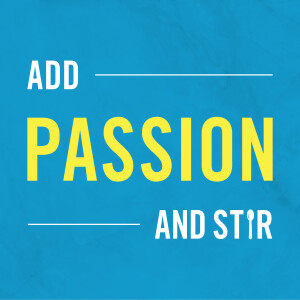
Psychological Change: Bringing Dignity to Poor Communities
 2018-11-06
2018-11-06
How can we move poor communities from hopelessness to hopefulness? In this fascinating episode of
Add Passion and Stir, Pierre Ferrari, President and CEO of Heifer International, and Matt Bell, chef and
owner of South on Main restaurant in Little Rock, share insights about creating value in poor communities
with hosts Debbie and Billy Shore. Ferrari speaks about the success Heifer International has had in poor
agricultural communities throughout the world by driving social psychological change before anything
else. “We work with communities that could almost be described as clinically depressed...the despair is so
deep…they feel condemned to this situation,” he says. Heifer uses value-based training to demonstrate to
people their own ability and capacity to make change. “Without that psychological shift, nothing we do, no
animal, no training will actually catch,” he notes. Bell has first-hand knowledge of the success of this
model in Arkansas. He sources his chickens from Grassroots Farm Cooperative, a cooperative of 10
formerly struggling small farms in Little Rock that was formed with the help of Heifer International to meet
the demand of the growing market. “My understanding of Heifer at the time was you buy a cow and
someone somewhere gets a cow. I didn’t understand this small business component. I didn’t understand
it could happen in Arkansas,” says Bell.
Heifer International provides resources, capital, and knowledge to help enable small farmers to generate
sustainable income, which gets cycled back into their communities creating opportunities for building
schools, creating agricultural cooperatives, forming community savings and funding small businesses.
Ferrari describes a program with female farmers in Nepal which is creating a goat meat value-chain by
working with banks to fund this system. There are now 150,000 women organized into small self-help
groups, which organize into larger co-ops and then an even larger union. “They are now feeling the
dignity of being economically self-reliant,” he concludes. Heifer International measures success by giving
people a ‘living income,’ which is a carefully calculated value that is “very complicated…but basically lets
farmers live a life of dignity,” says Ferrari. Bell recalls his childhood when parents in his community
created an informal system to ensure one little boy growing up in poverty always had food. “A group of
moms would take turns packing and extra lunch for Daniel, and they would say, ‘Make sure you give this
to Daniel before you get to class, so there’s no stigma,’” he remembers. Growing up on a cattle ranch
also gave him a unique perspective on the food chain. “An understanding of that gives us more empathy
into how we tackle hunger issues worldwide and locally.” Bell’s values led him to become a passionate
supporter of the No Kid Hungry campaign.
Get inspired by this sincere discussion about ending hunger and poverty.
More Episodes
 2022-12-28
2022-12-28
 2022-11-16
2022-11-16
 2022-10-05
2022-10-05
 2022-09-21
2022-09-21
 2022-09-07
2022-09-07
 2022-06-22
2022-06-22
 2022-06-08
2022-06-08
Create your
podcast in
minutes
- Full-featured podcast site
- Unlimited storage and bandwidth
- Comprehensive podcast stats
- Distribute to Apple Podcasts, Spotify, and more
- Make money with your podcast
It is Free
- Privacy Policy
- Cookie Policy
- Terms of Use
- Consent Preferences
- Copyright © 2015-2024 Podbean.com




